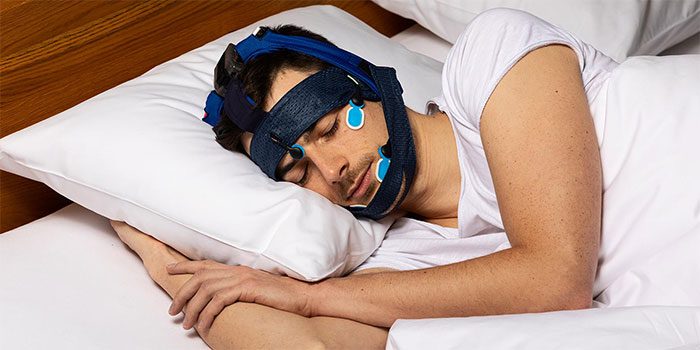As people age, they not only find it harder to sleep but also take longer to enter deep sleep.
The SleepLoop device is a new experimental tool designed to assist users by emitting sounds that help them achieve deeper sleep.
SleepLoop is currently being developed at the Swiss Federal Institute of Technology Zurich (ETH Zurich). The device is inspired by previous research that concluded sounds played through headphones can enhance brain waves known as slow waves. During deep sleep, the eyes and muscles relax, and brain waves slow down compared to other sleep stages.

The device continuously monitors the brain activity of the wearer.
Sleep is essential for life. However, in reality, many people face sleep deprivation. Chronic insomnia is linked to metabolic diseases like diabetes, as well as brain disorders, including Alzheimer’s disease.
Until now, the results of generating slow waves have only been achieved in controlled sleep laboratory settings. In contrast, SleepLoop is designed for home use every night (if needed).
The headband of the device contains electrodes and a microchip. This allows it to continuously monitor the brain activity of the wearer. As soon as it detects slow waves, SleepLoop emits an auditory signal. Although the wearer is not consciously aware of this sound, the signal is believed to enhance slow waves by helping synchronize the activity of related neurons.
In a trial, 16 volunteers aged 62 to 78 used SleepLoop at home every night for four weeks. The device emitted sleep-promoting signals for only two weeks. However, neither the participants nor the researchers were aware of which two weeks those were.
When the recorded data was analyzed later, scientists found that the use of SleepLoop had indeed improved slow waves in some of the test subjects. Meanwhile, the device had little or no effect on others.
Based on these findings, scientists are working to establish a method to predict how well the device will perform on specific individuals, thereby improving the effectiveness of SleepLoop.
SleepLoop is currently being commercialized by Tosoo Spinoff Company. A research paper led by Dr. Caroline Lustenberger was recently published in the journal Communications Medicine.

















































